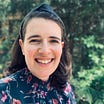This essay is part of a new collection of work inspired by the anthology On Being Jewish Now: Reflections of Authors and Advocates. Want to contribute? Instructions here. Subscribe here.

I’ve been listening to a song on repeat, but I can’t sing the chorus—not yet. The song is in Hebrew, by the Israeli singer-songwriter Ishay Ribo. Though Hebrew lyrics usually wash over me, pleasantly incomprehensible, this particular song smacked me over the head.
לשוב הביתה was the title: lashuv habayita, “to return home.” I knew enough Hebrew to understand that much. And it was the Jewish month of Elul, a time of reflection and cheshbon hanefesh, spiritual accounting. Listening to the song as I stepped off the Red Line in Chicago, I didn’t understand the vast majority of the words—but I knew in my bones that the song was perfect for the lead-up to Rosh Hashanah and Yom Kippur.
It felt like Ishay Ribo was singing directly to me, and directly to that moment: the new year approaching and the last horrible year coming to a close that was no close, no pause, no peace. I stared in a daze at the Pandora app on my phone, Ribo’s honeyed voice rising to a call to action—but to what action? I was pretty sure habayita referred to a spiritual home. A second train came and went while I strained to understand more of the words coming through my headphones.
I’m an Elul girlie. My birthday is in Elul and I began learning about Judaism as a college student in New York City during Elul — in fact, the first thing I learned about was how meaningful the month of Elul is. My rabbi was a Chabad baal teshuva (there’s that root word shuv again: a baal teshuva is a “master of return,” someone who grew up secular and became religious). I stayed for Shabbat dinner and then stayed and stayed.
I crushed and dated and graduated from college. I became observant and less observant and more observant. I got married young to my smart and sometimes-serious, sometimes-silly Modern Orthodox boyfriend—a JDate success story. He began to teach me Yiddish, which he had learned in college, and we roamed the city with our passionate crew of young Yiddishists—Yiddish-language activists.
If there was a Jewish language I had intended to learn, it was Hebrew. But, as they say, Yiddish is what happens while you’re busy making other plans. Ikh veys, I know, that doesn’t happen, but it happened to me, and after months of stumbling along, I learned to speak Yiddish conversationally. Yiddish became my whole beloved world.
Years later, much of that life feels dusty: the young marriage (we got divorced, and have both remarried); my life in New York (I’ve since lived in three other cities); even my Yiddish (I still love to speak it, but my grip on the language has slipped).
The song was a thunderclap, a thunderstorm. Hebrew. Hebrayish. Ivrit.
It wasn’t good enough to almost comprehend, like I always did, like a kid in the Peanuts world listening to adults: wah wah wah wah wah. I must pay attention. Get inside the words. I must understand.
הגיע הזמן להתעורר
לעזוב הכל, להתגבר
לשוב הביתה
לא לחפש מקום אחר
Higiya hazman lehitorer
Lazov hakol, lahitgaber
Lashuv habayita,
Lo lechapes makom acher
(“The time has come to wake up
to leave everything, to overcome
to return home
to not look for anywhere else”)
I realized in a rush—walking down the stairs to exit the train station and feeling very New York and unencumbered, like I wasn’t forty and a mother, like I could start all over again, back at the Chabad house and back to taking Hebrew in college, back to praying out of a blue siddur and willing those foreign lines on half the pages to look more like letters and less like a wall—that I don’t want Hebrew instead of Yiddish. I want to finally learn Hebrew too.
Julie Sugar’s journalism, nonfiction, poetry, and reviews have appeared in outlets such as the Forward, Lilith Magazine, Kveller, Modern Loss, and Jewish Review of Books, and she was also a script writer at YiddishPOP, which teaches Yiddish with short animated movies. She is currently working on her first book, a memoir-in-essays.
Instagram: @juliesugarwrites
This essay is part of a new collection of work inspired by the anthology On Being Jewish Now: Reflections of Authors and Advocates. Want to contribute? Instructions here. Subscribe here.




This was a wonderful read Julie!!!